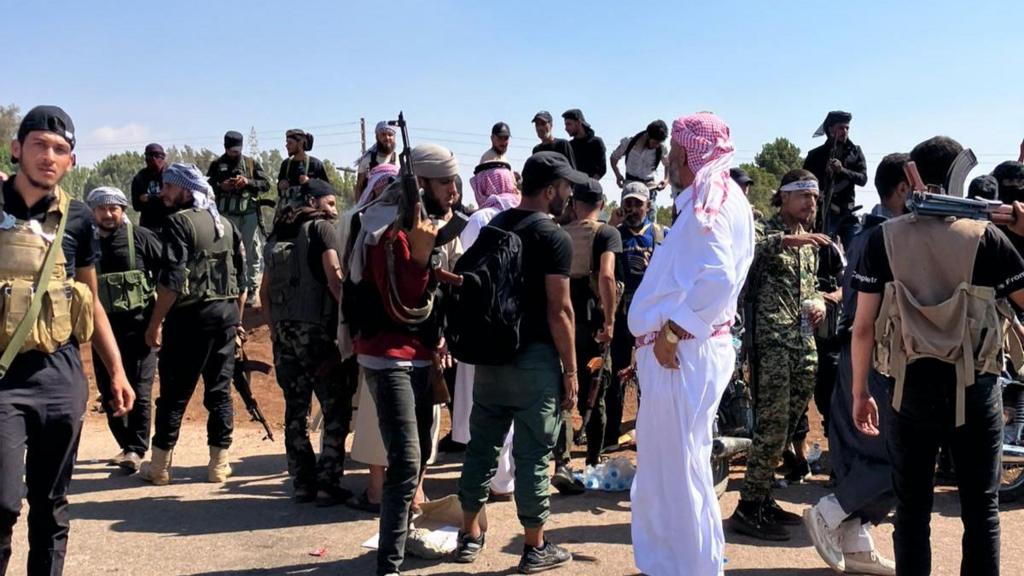Bedouin fighters stationed outside the southern Syrian city of Suweida have informed the BBC that they will observe a ceasefire with the Druze community. However, they have not dismissed the possibility of resuming hostilities.
Following a week of deadly sectarian clashes involving Druze fighters, Bedouins, and government forces, the Bedouin fighters have withdrawn from the city to neighboring villages within the province. Israel conducted airstrikes in support of the Druze.
On Sunday, a UK-based monitoring group reported a “cautious calm” in the region, but later indicated that tribal fighters had attacked villages.
Smoke emanating from Suweida city could be seen across the fields from the town of al-Mazara’a, a Druze town until last week when it was seized by the Bedouin and is now under Syrian government control.
A mound of dirt served as a barrier across the road at a nearby checkpoint. Dozens of heavily armed government security personnel were stationed along it, preventing the Bedouin from re-entering the city.
Hundreds of Bedouin fighters, many firing guns into the air, crowded the road.
They are demanding the release of injured Bedouin individuals still in Suweida city, whom they refer to as hostages. They have stated that if their demands are not met, they will force their way past the checkpoint and return to the city.
“We adhered to the government’s orders and are committed to the agreement. We have returned, and Suweida is 35km away from here,” a tribal elder told the BBC.
“Currently, our hostages and wounded are there, and they are refusing to release anyone… If they do not honor the agreement, we will re-enter, even if Suweida becomes our cemetery.”
Long-standing tensions between Druze and Bedouin tribes escalated into deadly sectarian clashes a week ago, following the abduction of a Druze merchant on the road to the capital, Damascus.
Interim President Ahmed al-Sharaa’s government responded by deploying forces to the city. Druze residents of Suweida told the BBC they had witnessed “barbaric acts” as gunmen – government forces and foreign fighters – attacked people. Israel targeted these forces, stating that it was acting to protect the Druze population.
Government forces withdrew, and Druze and Bedouin fighters subsequently clashed. Both Druze and Bedouin fighters have been accused of atrocities over the past week, as well as members of the security forces and individuals affiliated with the interim government.
On Saturday, al-Sharaa announced a ceasefire and dispatched security forces to Suweida to quell the fighting.
Local Druze fighters have regained control of the city. However, the UK-based Syrian Observatory for Human Rights (SOHR) reports that more than 1,120 people have been killed.
The deceased include 427 Druze fighters and 298 Druze civilians, 194 of whom were “summarily executed by defence and interior ministry personnel,” according to the monitor.
Additionally, 354 government security personnel and 21 Sunni Bedouin were killed, including three civilians who were “summarily executed by Druze fighters,” the SOHR stated. It also reported that 15 government troops were killed in Israeli strikes.
The UN migration agency reported on Sunday that at least 128,000 people have been displaced by the violence. The SOHR also noted that Suweida city is facing a severe shortage of medical supplies.
A first humanitarian convoy from the Syrian Red Crescent has reportedly reached the city. Israel’s public broadcaster reported that Israel had sent medical aid to the Druze.
US Secretary of State Marco Rubio has called on the government to “hold accountable and bring to justice anyone guilty of atrocities including those in their own ranks” in order to preserve the possibility of a united and peaceful Syria.
In Mia’rbah, southwest of Suweida, Bedouin refugees have gathered at what was formerly a school. The village still bears the scars of years of civil war, with buildings in ruins and riddled with bullet holes.
At the aid distribution centers, elderly Bedouin women collected water from a tank on the back of a truck. The majority of the people present were women and children.
When asked whether she believed Bedouin and Druze could coexist, a woman displaced from Suweida city stated that it would depend on the government in Damascus.
“They can live together if the government will take over and rule, and if the government will provide peace and security,” she said.
She added that in the absence of government authority, she believed that Bedouin could not trust the Druze.
“They are traitors, without peace and security we can’t live with them,” she said.
Additional reporting by Jack Burgess
The UN human rights chief says those responsible for violations and abuses “must be held to account.
One woman tells the BBC she cowered in her home waiting for gunmen to enter and “decide whether we should live or die”.
The Syrian Observatory of Human Rights (SOHR) documented a significant outbreak of brutality in the killings that gripped Suweida province.
The deadly unrest, along with the violent Israeli strikes, have re-ignited fears of a security breakdown in Syria
Ahmed al-Sharaa spoke after Israel said it would destroy government forces it accused of attacking Druze in Syria.

